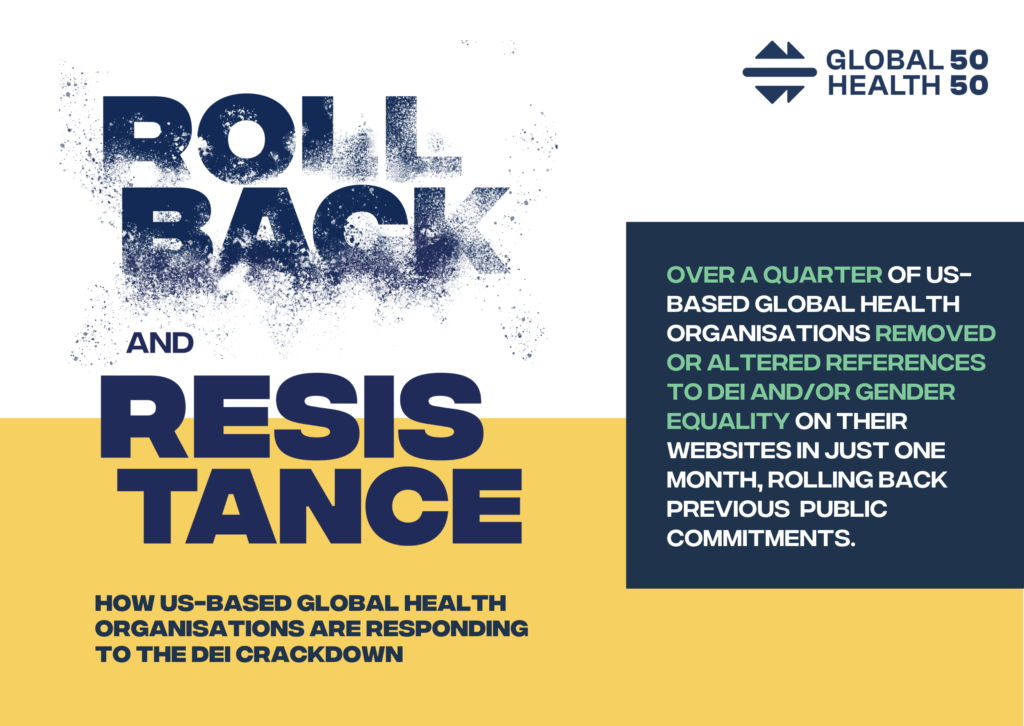
The data and findings presented in this report reflect the status of public information, organisational policies, and government directives as of 14 February 2025. Given the rapidly evolving landscape, including ongoing legal challenges and policy shifts, some webpages and resources that were initially removed may have been reinstated, while others remain inaccessible or have been modified. This report provides a snapshot of the situation at that time, and developments beyond this date may not be reflected.
The US administration’s removal of language around gender (and replacing it with sex), and dismantling of DEI policies is not just a domestic issue—it is reshaping gender equality, workplace equality, and global health priorities worldwide. As the largest funder of global health, the US plays an outsized role in shaping global health governance, financing, and decision-making. Shifts in US policy do not happen in isolation—their ripple effects are felt across organisations, institutions, and entire health systems worldwide.
Global Health 50/50’s 2025 report, Rollback and Resistance, provides recent data on how US-based global health organisations are responding, highlighting the risks, the resistance, and the urgent need for collective action to defend progress. With 40% of global health board seats held by Americans, US priorities and funding decisions directly influence whose voices shape global health, which policies receive backing, and ultimately, whose health and rights are prioritised. As DEI rollbacks intensify, the question is no longer just about the US—it is about the future of gender equality and workplace inclusion across the entire global health sector.
Key findings: DEI is Being Dismantled
Over a quarter of US-based global health organisations removed or altered references to DEI and gender equality on their websites in just one month, rolling back previously public commitments.
- 20% reduction in publicly available commitments to gender equality.
- 33% decrease in published definitions of gender aligned with UN standards.
- 23% drop in workplace gender equality policies.
- 27% reduction in workplace DEI policies.
What’s driving this rollback? A Deliberate Attack on DEI in Global Health
- Within 48 hours of taking office, President Trump issued sweeping executive orders halting DEI programmes across federal agencies and directing organisations receiving federal funding to cease DEI activities
- These orders forced organisations receiving federal funding, including contractors and grant recipients, to certify that they do not engage in DEI work in order to maintain federal funding.
- In response, major US-based global health organisations have scrubbed references to DEI to avoid legal and financial repercussions.
These policies are not just reshaping the US—they are influencing the entire global health sector.
The Consequences: Beyond Language
• Thousands of DEI-related webpages were taken down following the executive orders. Some have since been reinstated due to legal challenges, but many remain inaccessible.
• Government agencies are revising policy documents to remove terms like gender identity, non-binary, and trans health.
• Workplace DEI training and recruitment efforts are being abandoned as organisations navigate compliance pressures.
• This directly affects funding, governance, and leadership in global health. If left unchecked, the erosion of DEI policies will set a dangerous precedent that extends far beyond the US.
Resisting the Rollback: Organisations Are Fighting Back
Despite mounting pressure, not all organisations are backing down. While the rollback of DEI policies is widespread, many are finding ways to resist—proving that commitment to equity goes beyond what’s written on a website.
- Maintaining DEI, but off the record – Some organisations continue to uphold DEI internally while removing public references to avoid funding cuts and political retaliation.
- Standing firm and speaking out – Others are refusing to erase their commitments, publicly pushing back despite the risks.
- Uniting to fight back – Global coalitions are forming to document, challenge, and resist these rollbacks, ensuring the attack on DEI does not go unchallenged.
“They can (executive) order policies off our website, but they cannot change our values. If taking our DEI policies off our website is the price we pay to continue our work, I’ll pay it. We will still be a diverse team that ensures equity and creates an inclusive workplace environment.”
— President & CEO of consistently high-performing organisation in annual GH5050 reports
What Needs to Happen Now: A Call to Action
The global health sector must act urgently to prevent further rollbacks.
-
- Monitor and document the rollback
We must track and report DEI rollbacks across the sector. GH5050 invites organisations, researchers, and advocates to contribute to this collective effort. - Collaborate. communicate and energise
We need to build and connect progressive coalitions that transcend silos of gender, class, race and geography.
- Counter disinformation
The anti-DEI movement thrives on misinformation. We must push back with facts, evidence, and coordinated advocacy wherever DEI is under threat. - Keep the heat on
Let’s keep the pressure on all organisations to build progressive workplaces, and press leaders – governments, multilaterals, funders – to step into the void left by the US government and increase funding for gender equality, democratic norms and social justice initiatives around the world.
- Monitor and document the rollback
Read, share, and act now:
Contact us
To engage with us on advancing gender equality in global health, or to learn more about our methodology, collective, leadership and values, contact us at: info@globalhealth5050.org.

